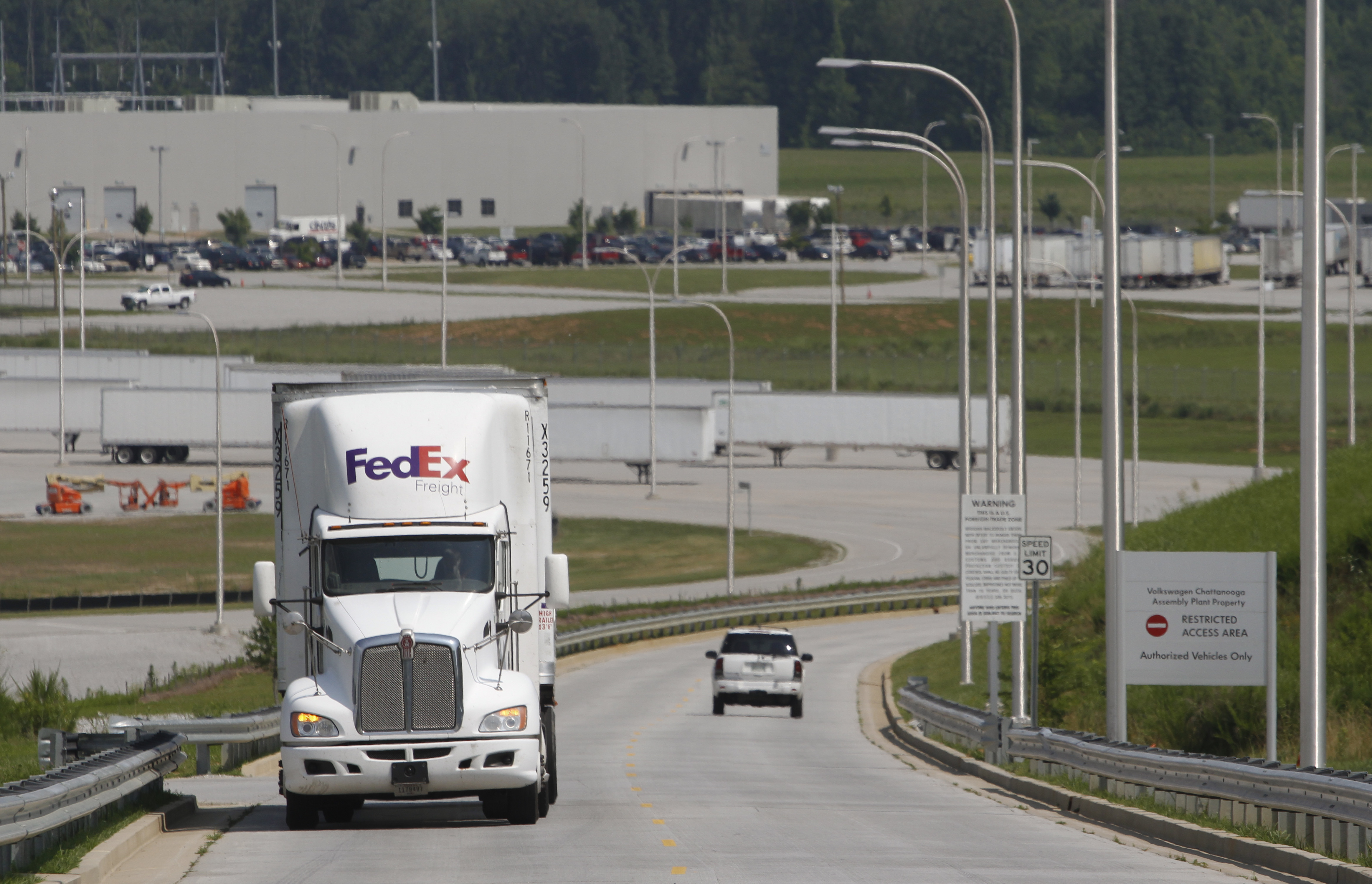View our Volkswagen/UAW special page with timeline, slideshow, local and national coverage and opinions
Slightly fewer than two of every three Volkswagen plant workers live in Hamilton County even though Chattanooga and the county, along with the state, pledged about $577.4 million worth of tax incentives to woo the automaker.
A ZIP code analysis of nearly 2,400 employee addresses shows that almost 65 percent live in Hamilton County. About 10.6 percent commute from Georgia and about 1.1 percent come from Alabama. Nearly all the remainder, more than 23 percent, live in Southeast Tennessee outside of Hamilton, the Chattanooga Area Chamber of Commerce figures show.
Charles Wood, the Chamber's vice president of economic development, said it's not possible for Hamilton County to capture all the employees at the plant, noting the city is the hub for the region.
"We hope when we've made a big investment, we want the city and county to benefit," he said. "They stand to be first in line to do that."
The $577.4 million in incentives offered in 2008, a record for an auto plant in the U.S. at the time, included about $133 million in local payment-in-lieu-of-tax agreements for VW, estimates showed. VW also received a $39.3 million city and county grant for plant infrastructure. In addition, the state offered jobs and machinery tax credits and site development and infrastructure grants.
Helen Burns Sharp, a Chattanoogan who has criticized some tax incentives to companies in the county, said the VW plant project is an example of the importance of the agreements and that people need to pay more attention to those.
"It's the people here in the county and city who are affected by not getting the tax revenue," she said. "It's not the people living in Bradley County who are affected."
Scott Wilson, a spokesman for VW in Chattanooga, declined comment on the employment figures, saying the plant is in summer shutdown until Monday and no one was available to address them.
VW had said in 2011, just before the plant's startup, that it was focusing its hiring on Hamilton, though it wasn't restricted to the county. There's nothing in the memorandum of understanding signed by the city, county, state and VW directing the automaker to hire a certain number of workers from Hamilton.
State House Majority Leader Gerald McCormick, R-Chattanooga, said Wednesday he'd rather that all of VW's employees be from the county.
But, he said, he's not surprised at the numbers, given that people in Bradley County and in some North Georgia counties are less than 10 minutes from the plant.
"VW has to cast the net to get the workforce," said McCormick, in whose district the automaker's plant sits. "I'm sure VW is looking for the best people."
The VW plant is the front runner to land a new sport utility vehicle that could bring upwards of 1,000 additional jobs, and the state earlier offered nearly $300 million more in incentives to try to land that project.
Chattanooga Mayor Andy Berke said in an email that his priority is to bring the new vehicle line to the city.
"If the SUV goes to Mexico, zero Chattanoogans will be getting those jobs," he said. "Once we have secured the expansion, we will join with our workforce development partners to get as many city residents working as possible."
Hamilton County Mayor Jim Coppinger said that ideally he'd like all the employees to be from the county, "but realistically we understand that may not happen."
Martha Eaker, the Catoosa County, Ga., Chamber's CEO, said she, too, would like for more of its residents to be working at VW. She said that, typically, 20 to 25 percent of Catoosa's workforce leaves the county for their jobs.
Eaker said Georgia Northwestern Technical College is putting a campus in Catoosa that will include training for robotic-type positions, which will be a fit at VW. Education, she said, is key for manufacturing jobs.
But officials also noted that it's not necessarily bad to have VW workers who commute from outside Hamilton County.
"All those people coming in from the area are spending money in Hamilton County," McCormick said.
Clint Brewer, an assistant commissioner for the Tennessee Department of Economic and Community Development, said that having people from Georgia and Alabama coming into the state to work also attracts sales tax dollars.
He said having people come across the line means they're exposed to merchants, banking, health care and retail.
"It's not the worst thing in the world to have them spend money in Tennessee," Brewer said, though he added he'd like for the state to attract as many of the jobs as possible.
A University of Tennessee study last year found that VW has spurred more than 12,400 direct and indirect jobs through 2012, which was about 1,000 more than was predicted in 2008.
The study estimated that the carmaker generates $643.1 million annually in personal income direct to VW workers and indirectly to countless others. The plant also boosts state and local tax revenues by $53.5 million a year.
Dr. William Fox, who directs the UT Center for Business and Economic Research and performed the study, said auto factories have large economic spin-offs or "multiplier" effects because so much of their business is done with suppliers.
Contact Mike Pare at mpare@timesfreepress.com or 423-757-6318.

